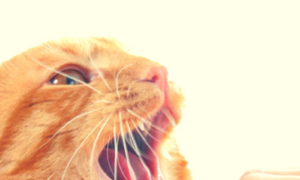By Karen Asp for The Daily Cat

This scenario may be all too familiar: An unsuspecting cat owner comes home from work to find that his or her once well-behaved feline has tipped over a houseplant, batted everything off the home office desk and pulled a foot-long thread from the living room curtains. What’s the scoop? Simply put, kitty could be bored.
Understanding Cat Boredom
To understand the behavior of a cat, consider what goes on in zoos. Several decades ago, zoo animals were often just given food and water and left to sit in their cages. Now, zookeepers devise numerous enrichment activities, encouraging the animals to hunt for food and even playing games with them.
“Today’s cats are like yesterday’s zoo animals — they stay home without much to do and rarely use their instincts to hunt, explore, play and interact,” says Steve Duno, a pet behaviorist in Seattle and author of Be the Cat (Sterling 2008). “As a result, they get a little nutty.”
While bored cats can exhibit destructive and antisocial behaviors, they might also demonstrate less obvious symptoms, including depression, excessive grooming, skin disorders, hypervocalization, house-training accidents, overeating and excessive sleeping.
Inspiration From Zoos
So what’s the solution? “Open your own zoo, so to speak, by offering your cat behavioral and environmental enrichments,” Duno says. However, instead of overwhelming your cat with these enrichments, introduce a few at a time.
In addition, don’t adopt a kitten to entertain your cat, especially if your cat is older and not used to other animals. “You’ll only create more problems,” says Dr. Sophia Yin, DVM, MS, author of Low Stress Handling, Restraint and Behavior Modification of Cats and Dogs (Cattledog Publishing 2009).
Cures for Kitty Doldrums
If your own cat seems stuck in a dreary rut, and any underlying health problems have been ruled out by your veterinarian, our experts advise the following:
Make your pet work for its food By nature, cats are hunters, which is why constantly putting their food in bowls or free-feeding may cause boredom. Instead, make it a game for them to find food. Dr. Yin recommends cutting 2-inch-high openings in a shoe box, making sure the openings go to the bottom of the box. Place your cat’s dry food under the box and let your furry pal bat it out. You can also use balls that hold food.
Train your cat “If you’re not free-feeding, cats are easy to train, and the training provides stimulation,” says Dr. Yin. She likes to train cats to “sit” and “come” for when they’re hungry enough to eat treats. To train your cat to sit, hold a treat away from your pet and wait until your cat sits. Then put the treat right up to your cat’s mouth and give it to your pet. If that doesn’t work, push the treat from your cat’s nose to right above its head, which should prompt a seated position. If your cat remains seated, reward with another treat. Now walk away while saying “come.” Your cat should follow you. Repeat the instructions for sitting to return your cat to a seated position. Be sure to reward with treats when warranted. Later, you can use these commands to distract your pet whenever it misbehaves.
Put kitty on the trail If possible, hide food — or other smell-good items — around the house to stimulate your cat’s olfactory sense and to excite its hunting drive. For instance, leave scent trails throughout the house. Drop a little lavender oil or cinnamon in various places, leading your cat to a treat. You can also hide catnip or place an evergreen bough out of reach of your cat.
Provide visual stimulation If possible, hang bird feeders near windows or a mobile from the ceiling — out of paw reach — for your cat to view. An aquarium or cat-themed DVDs are good for entertainment and companionship. You can also try rearranging the furniture to spark kitty investigations.
Boost the fun factor Set up scratching posts and leave out interactive toys. One caveat? “Rotate the toys so your cat doesn’t get bored seeing the same one,” Duno says.
Your cat should respond almost immediately to these enrichment activities. Not only will you notice that it is more interested in its environment, but you should also start to see behavioral improvements. Duno concludes, “Now that you’ve followed the lead of today’s zookeepers and provided a more stimulating environment for your cat, you’ll probably even notice that your cat is happier and more content with life.”
Karen Asp covers health, fitness, nutrition and pets for numerous publications, including Prevention, Woman’s Day, Shape, Self, Fitness, Health, Real Simple, Good Housekeeping and Natural Health. She shares her office with two cats.





